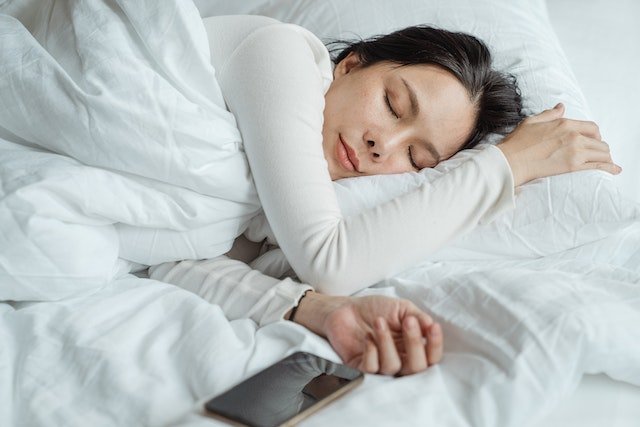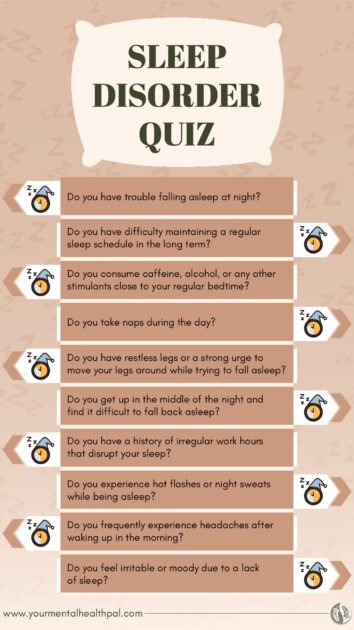If you regularly feel drained and sluggish throughout the day or wake up feeling depleted, chances are you might be dealing with a sleep disorder.
Sleep disorders occur on a wide spectrum. However, on a broader scale, they generally manifest as sleep duration, quality, or timing issues.
So, you could be getting seven hours of sleep and still have a sleep disorder because the quality of your sleep is low. Or, you could be getting good quality sleep but for a short duration, which is affecting your overall productivity and well-being.
As per the American Sleep Association, an astounding 50-70 million adults suffer from some form of sleep disorder. However, a majority of them go undiagnosed because people fail to identify the signs of sleep issues throughout their lives. Undiagnosed sleep disorders can lead to several health issues, including heart problems, diabetes, and much more in the long run.
This is exactly why knowing your sleep habits and understanding your sleep patterns is important.
To help you do just that – we have designed the perfect sleep disorder quiz for you. The YMHP sleep disorder quiz is your go-to self-assessment to determine the overall quality of your sleep and spot whether you have any sleep problems.
Let’s dive deeper into the YMHP sleep disorder quiz, who it is meant for, and how you can take one.

What Is The YMHP Sleep Disorder Quiz?
The YMHP sleep disorder test can help you determine the presence and extent of your persisting sleep problems. Your responses and overall sleep score can gauge how sleep disruption, inadequate sleep, or low-quality sleep issues have been affecting your regular life.
Designed with deep research around the obvious and not-so-obvious signs, the sleep disorder quiz questions and answers can help you learn more about the symptoms associated with various sleep conditions.
The quiz questions about sleep disorders are designed to reflect real-life sleep issues that are indicative of having a sleep disorder. These issues may arise from multiple factors, including work stress, irregular sleep patterns, difficulty falling asleep, etc.
How Accurate Is This Sleep Disorder Quiz?
This online sleep disorder test is not a definitive tool to diagnose a sleep disorder.
It is not a replacement for professional sleep disorder tests and can only be used as a self-screening tool. While this sleep disorder quiz can help you understand your sleep patterns or spot your worrying signs, it cannot give you a clear diagnosis and treatment plan.
If you are concerned about your well-being being affected by a persisting sleep disorder, it is essential to take a sleep disorder test monitored by a professional. Furthermore, consult your healthcare provider or sleep specialist to understand better what’s happening to you.

Sleep Disorder Quiz Questions
This sleep disorder questionnaire is for people wanting insight into their sleep patterns.
At each level, indicate how much you agree or disagree with the statement.
Each response you choose carries a certain number of points. The points distribution is:
- A lot – 5 points
- Very Often- 4 points
- Sometimes- 3 points
- Rarely- 2 points
- Never- 1 point.
In order to get the best results, answer all the questions honestly and keep track of your responses. Let’s get started.
YMHP Sleep Disorder Quiz
1. Do you have trouble falling asleep at night?
- A lot
- Very Often
- Sometimes
- Rarely
- Never
2. Do you feel restless or alert closer to your bedtime?
- A lot
- Very Often
- Sometimes
- Rarely
- Never
3. Do you wake up at night frequently?
- A lot
- Very Often
- Sometimes
- Rarely
- Never
4. Do you frequently use the bathroom at night?
- A lot
- Very Often
- Sometimes
- Rarely
- Never
5. Do you have difficulty maintaining a regular sleep schedule in the long term?
- A lot
- Very Often
- Sometimes
- Rarely
- Never
6. Do you feel increased stress or anxiousness at night?
- A lot
- Very Often
- Sometimes
- Rarely
- Never
7. Do you consume caffeine, alcohol, or any other stimulants close to your regular bedtime?
- A lot
- Very Often
- Sometimes
- Rarely
- Never
8. Do you use electronic devices like mobile phones, television, computers, etc., closer to your bedtime?
- A lot
- Very Often
- Sometimes
- Rarely
- Never
9. Do you take naps during the day?
- A lot
- Very Often
- Sometimes
- Rarely
- Never
10. Do you have restless legs or a strong urge to move your legs around while trying to fall asleep?
- A lot
- Very Often
- Sometimes
- Rarely
- Never
11. Do you find it difficult to unwind and relax at night?
- A lot
- Very Often
- Sometimes
- Rarely
- Never
12. Do you get up in the middle of the night and find it difficult to fall back asleep?
- A lot
- Very Often
- Sometimes
- Rarely
- Never
13. Do you have tingling or crawling sensations in your arms and legs when you try to sleep?
- A lot
- Very Often
- Sometimes
- Rarely
- Never
14. Do you have a history of irregular work hours that disrupt your sleep?
- A lot
- Very Often
- Sometimes
- Rarely
- Never
15. Do you experience sleepwalking or any other unusual behaviors during sleep?
- A lot
- Very Often
- Sometimes
- Rarely
- Never
16. Do you grind your teeth while being asleep?
- A lot
- Very Often
- Sometimes
- Rarely
- Never
17. Do you have a family history of sleep issues?
- A lot
- Very Often
- Sometimes
- Rarely
- Never
18. Do you use any sleep-related medications at night?
- A lot
- Very Often
- Sometimes
- Rarely
- Never
19. Do you experience hot flashes or night sweats while being asleep?
- A lot
- Very Often
- Sometimes
- Rarely
- Never
20. Do you have trouble staying attentive and awake during the day while reading, watching TV, etc.?
- A lot
- Very Often
- Sometimes
- Rarely
- Never
21. Do you frequently experience headaches after waking up in the morning?
- A lot
- Very Often
- Sometimes
- Rarely
- Never
22. Do you feel irritable or moody due to a lack of sleep?
- A lot
- Very Often
- Sometimes
- Rarely
- Never
23. Do you have a history of chronic pain that affects your sleep?
- A lot
- Very Often
- Sometimes
- Rarely
- Never
29. I have trouble falling asleep at night.
- A lot
- Very Often
- Sometimes
- Rarely
- Never
30. Do you experience sleep disturbances after a particular stressful event?
- A lot
- Very Often
- Sometimes
- Rarely
- Never
31. Have you ever been told that you stop breathing while sleeping (characterized as sleep apnea)?
- A lot
- Very Often
- Sometimes
- Rarely
- Never
32. Do you have a history of mental health conditions?
- A lot
- Very Often
- Sometimes
- Rarely
- Never
33. I have trouble falling asleep at night.
- A lot
- Very Often
- Sometimes
- Rarely
- Never
34. Do you frequently have racing thoughts and worries closer to bedtime?
- A lot
- Very Often
- Sometimes
- Rarely
- Never
35. Do you struggle to manage your sleep schedule while traveling in different time zones?
- A lot
- Very Often
- Sometimes
- Rarely
- Never
36. Do you experience jerking or falling while being asleep?
- A lot
- Very Often
- Sometimes
- Rarely
- Never
37. Do you have trouble sleeping when there is any background noise?
- A lot
- Very Often
- Sometimes
- Rarely
- Never
38. Do you have difficulty waking up refreshed even after having seven hours or more of sleep?
- A lot
- Very Often
- Sometimes
- Rarely
- Never
39. Do you wake up early in the morning and struggle to fall asleep?
- A lot
- Very Often
- Sometimes
- Rarely
- Never
40. Do you have a roommate or partner who complains about your disruptive sleep habits, like kicking, snoring, etc.?
- A lot
- Very Often
- Sometimes
- Rarely
- Never
41. Have you ever felt sleep paralysis (the inability to move upon waking up or falling asleep)?
- A lot
- Very Often
- Sometimes
- Rarely
- Never
42. Do you feel anxious or stressed during the day after not having sufficient sleep?
- A lot
- Very Often
- Sometimes
- Rarely
- Never
43. Do you have an itching or burning sensation on the skin while falling asleep?
- A lot
- Very Often
- Sometimes
- Rarely
- Never
44. Have you ever been told that you make loud noises while being asleep?
- A lot
- Very Often
- Sometimes
- Rarely
- Never
45. Do you wake up with a racing heart or palpitations during the night?
- A lot
- Very Often
- Sometimes
- Rarely
- Never
46. Do you have frequent nightmares?
- A lot
- Very Often
- Sometimes
- Rarely
- Never
Results
Now that you have completed the YMHP sleep disorder quiz, it is time for results.
Wondering what is a good sleep quality score? Let’s find out.
Your total sleep score:
- A lot (5 points) x Number of times selected
- Very Often (4 points) x Number of times selected
- Sometimes (3 points) x Number of times selected
- Rarely (2 points) x Number of times selected
- Never (1 point) x Number of times selected
Result interpretation:
1. 110 or more points – Sleep disorder likely present.
Given your sleep disorder test results, it is beneficial to consult a healthcare professional to discuss your sleep patterns.
2. 94-110 points – Moderate sleep disturbances.
Your responses to these quiz questions about sleep disorders point toward moderate chances of issues. Consulting a healthcare provider is recommended.
3. 70-94 points – Possible sleep issues.
Your answers to the sleep disorder quiz questions indicate certain sleep issues that might need your attention.
4. 47-70 points – Minimal or no sleep problems.
Your score suggests minor sleep issues that can be dealt with by specific changes in your sleep schedules.
Conclusion:
With growing stress and mental health concerns across the globe, it is no surprise that an increasing number of people are facing sleepless nights.
Sleep disorders are a grossly overlooked issue that needs immediate attention. The situation is so severe that the Centers for Disease Control (CDC) has called sleep deprivation a public health epidemic associated with multiple health risks.
This is exactly why keeping track of your sleep patterns is important. The YMHP sleep disorder quiz questions are designed specifically to help you do just that.
We hope this sleep disorder quiz will identify any negative trends in your sleep cycle.
Looking to understand more about the signs of sleep disorders. Click here to know more.
To continue learning about sleep and mental health, subscribe to Your Mental Health Pal.

